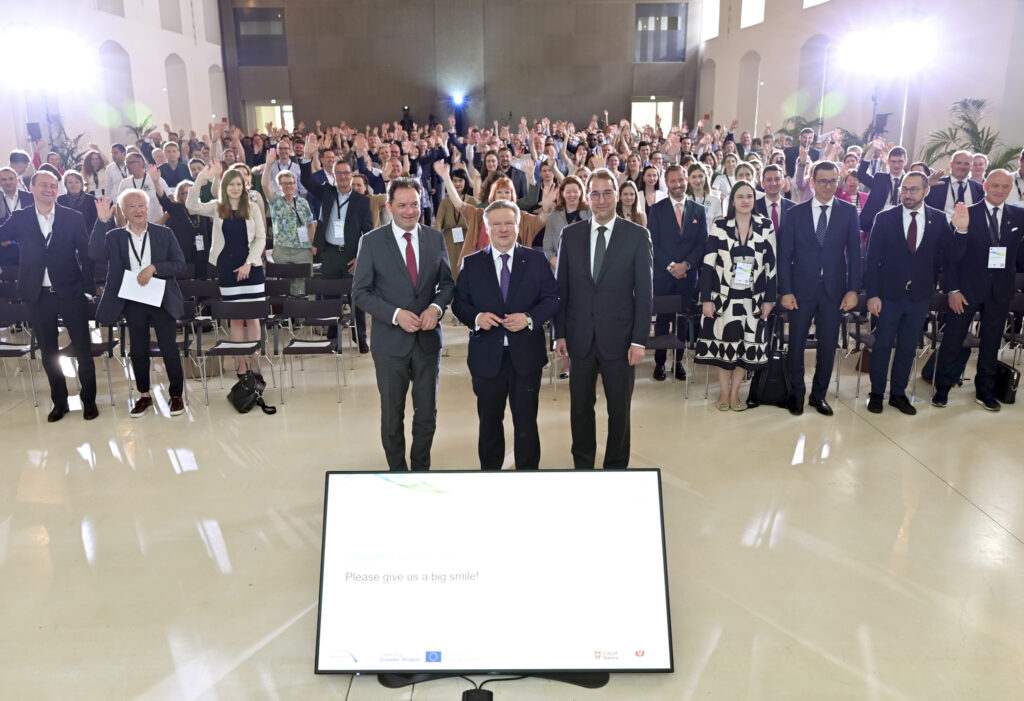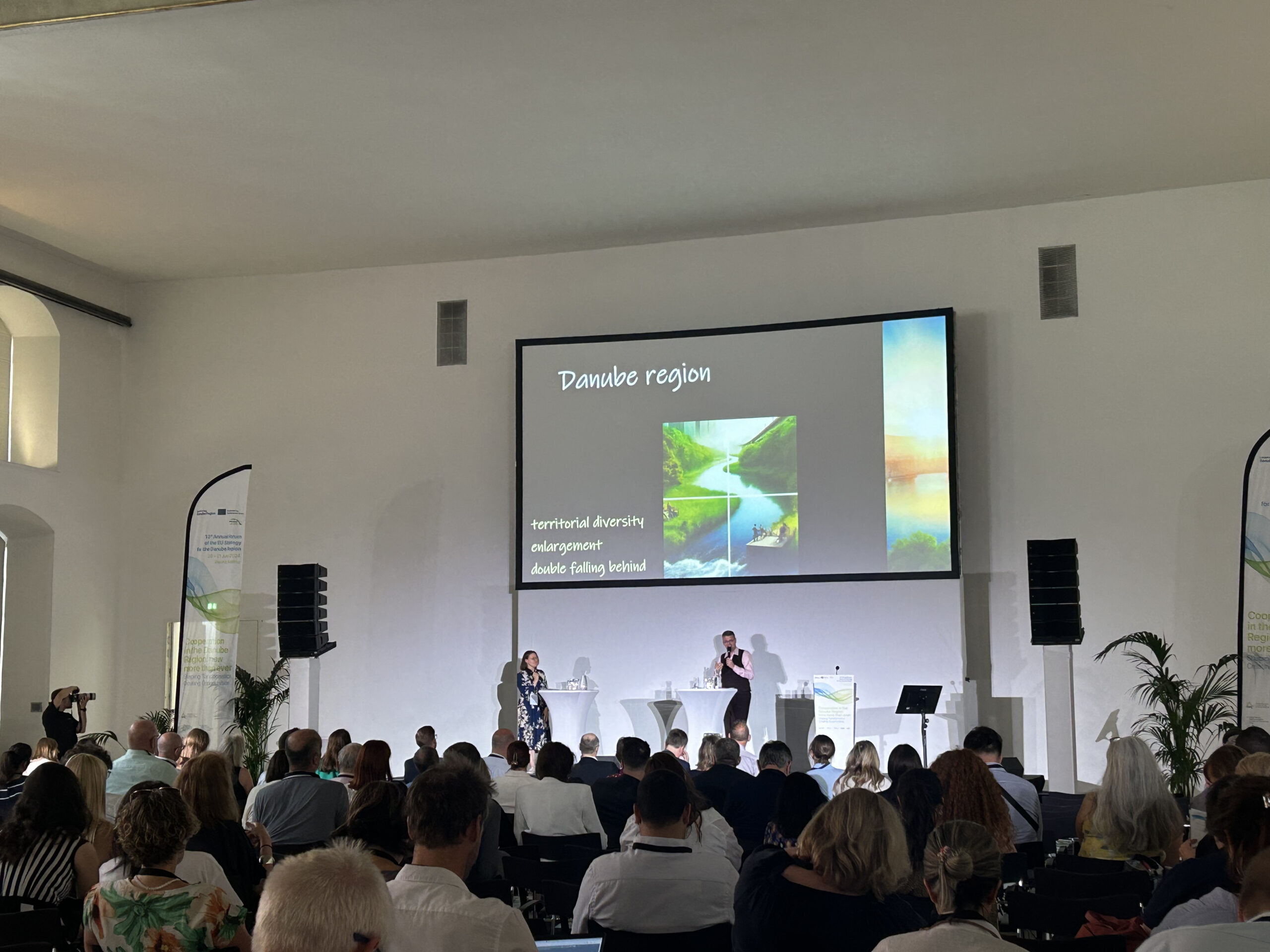The 13th Annual Forum of the EU Strategy for the Danube Region (EUSDR) took place in Vienna on 20-21 July, under the theme “Shaping Transformation, Creating Opportunities”. The programme featured a diverse range of discussions, keynotes, and interactive sessions aimed at promoting cooperation and innovation across the Danube Region.
The strategy is relevant for the Western Balkans, because it also includes three EU accession countries from the Western Balkans: Bosnia and Herzegovina, Montenegro, and Serbia. Overall, the area covered by the EU Strategy for the Danube Region stretches from the Black Forest in Germany to the Black Sea, i.e. Romania, Ukraine, and Moldova, and is home to 115 million people. Our POLICY ANSWERS colleague Fiorda Llukmani attended the event and provided the following event report.
The programme began with a session titled “Mayors Talk: Cities as Transformation Hubs of the Danube Region”. Benjamina Karić, the Mayor of Sarajevo, highlighted the importance to find solution to the severe air pollution problem in her city, which was among the most polluted in Europe last winter. She emphasised the need for mayors to transform such challenges into opportunities, noting that Novo Sarajevo, with its massive growth and development, is home to some of Bosnia and Herzegovina’s top universities. Karić stressed the importance of connecting youth with universities to combat brain drain, making university exchanges a priority for regional cooperation. She also underscored the unique historical significance of the cities and the necessity of collaborating on cultural heritage protection and exchange. Bosnia and Herzegovina is taking the lead of the EUSDR Presidency from Austria in 2025 and looks forward to welcoming the 14th Forum in Sarajevo next year.
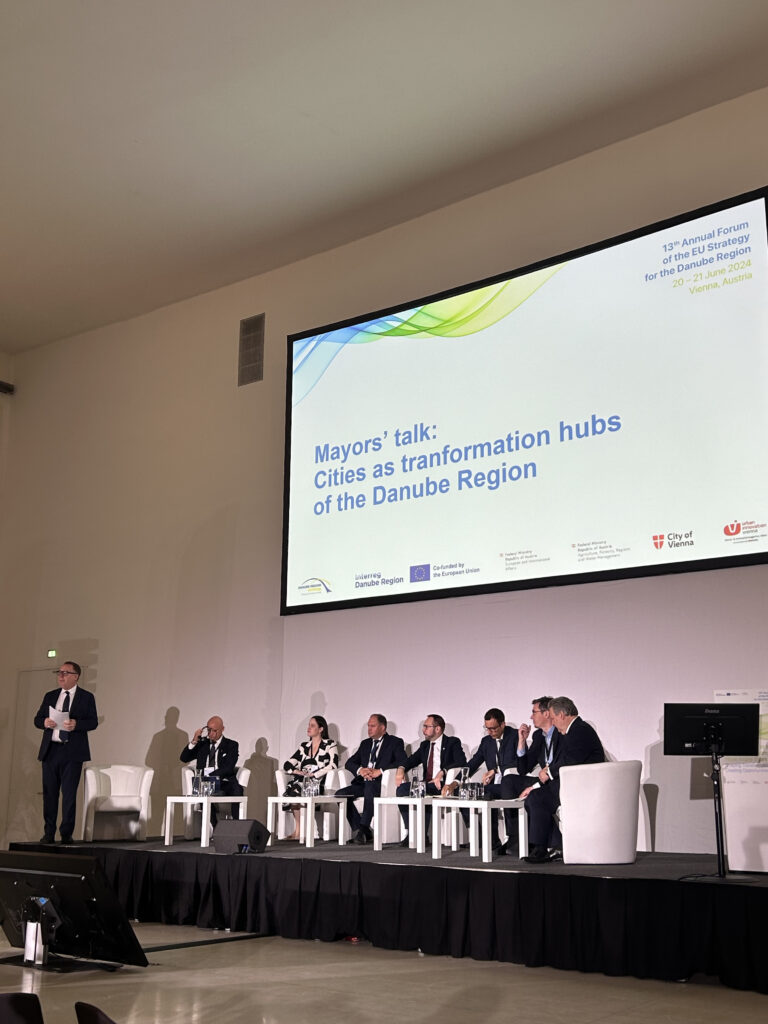
Several discussions focused on supporting “EU Enlargement through Macro-Regional Cooperation”. In one session, participants explored the question: “How can we involve civil society organisations and sub-national stakeholders to support the path towards EU accession?”
Participants suggested that for future cooperation, the Western Balkans should shift their mentality towards greater engagement with EU projects and involve sub-national actors more effectively. They identified fighting misinformation as a key priority, noting also that the population in the region is often unaware of EU funding opportunities. They argued that better understanding of how Western Balkans can benefit from the EU would increase the number of people joining pro-European interest groups.
Technical Assistance and Information Exchange (TAIEX), was highlighted as a potential resource . TAIEX is an instrument of the European Commission designed to provide short-term technical assistance to partner countries, primarily in the areas of understanding, approximating, applying, and enforcing EU legislation. The assistance is provided through activities like workshops. Involving youth in shaping future enlargement was also identified as crucial, particularly in addressing the region’s brain drain. By enhancing communication with civil society and academia to increase knowledge and offering hope to young people, the region could better retain its talent. Small and medium-sized enterprises (SMEs) should also be a priority, through exchanges and learning opportunities with the EU counterparts.
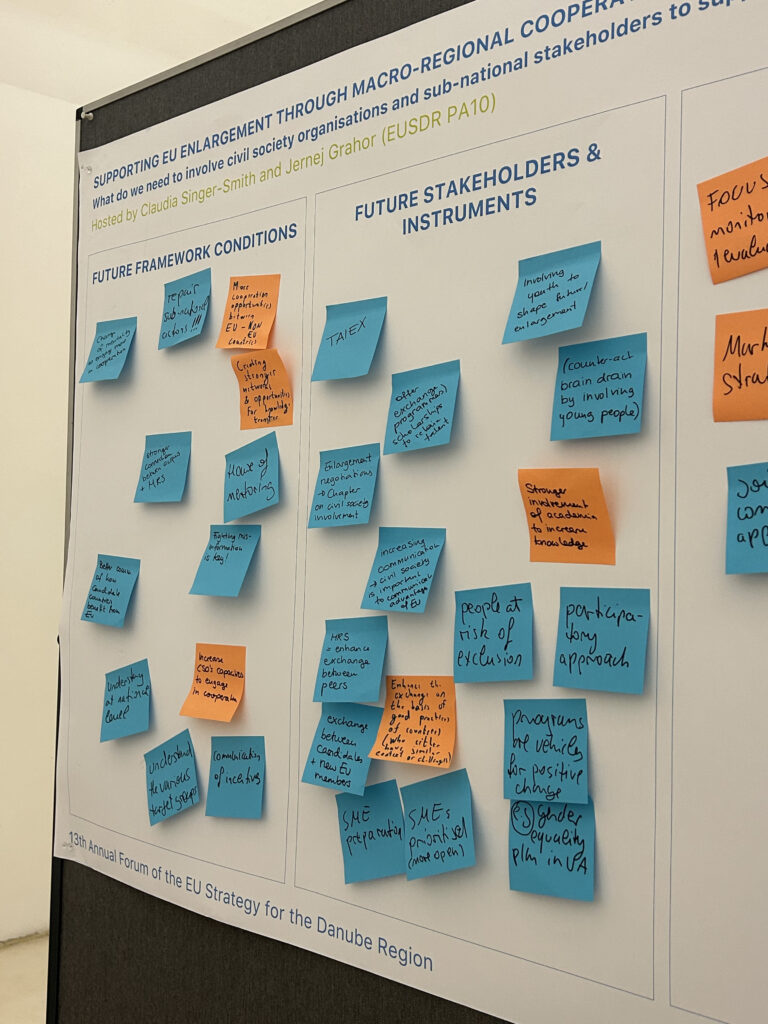
Regarding immediate steps, participants emphasised the need to focus on monitoring and evaluation. Accurate statistics are essential, to better identify the challenges, aspirations and necessary assistance tools, considering the resources available in the Danube Region. Other recommendations included impact assessments, marketing strategies, and information sessions about EU opportunities in particular in rural areas. Delivering the right information to the right audience in the right manner was seen as crucial for effective regional development.
The two-day event also showcased successful initiatives and projects from across the EUSDR area, including the Western Balkans, with our selected highlights below.
Supernatural Corporation, based in Belgrade, Serbia, is engaged in environmental projects in collaboration with scientific institutions and experts to create green campaigns and initiatives for businesses. The corporation promotes brands dedicated to positive environmental and social impacts. One of its significant projects involved Ada Huja, once a lush Important Bird Area (IBA) near Belgrade that was turned into a waste dump in the 1960s, destroying its ecosystem. In 2011, Supernatural Corporation signed a contract to clear the area and establish Supernatural Park, an educational, cultural, and environmental protection centre.
Friends of the Danube is a purpose-driven clothing brand launched by Supernatural in partnership with the Agapedia Foundation. The brand aims to promote, protect, and enhance the biodiversity of the Danube River through business activism, aspiring to create a sustainable business model that benefits both people and the planet. The brand’s tagline, “a thread that connects,” symbolises the river’s role in linking people across the region.
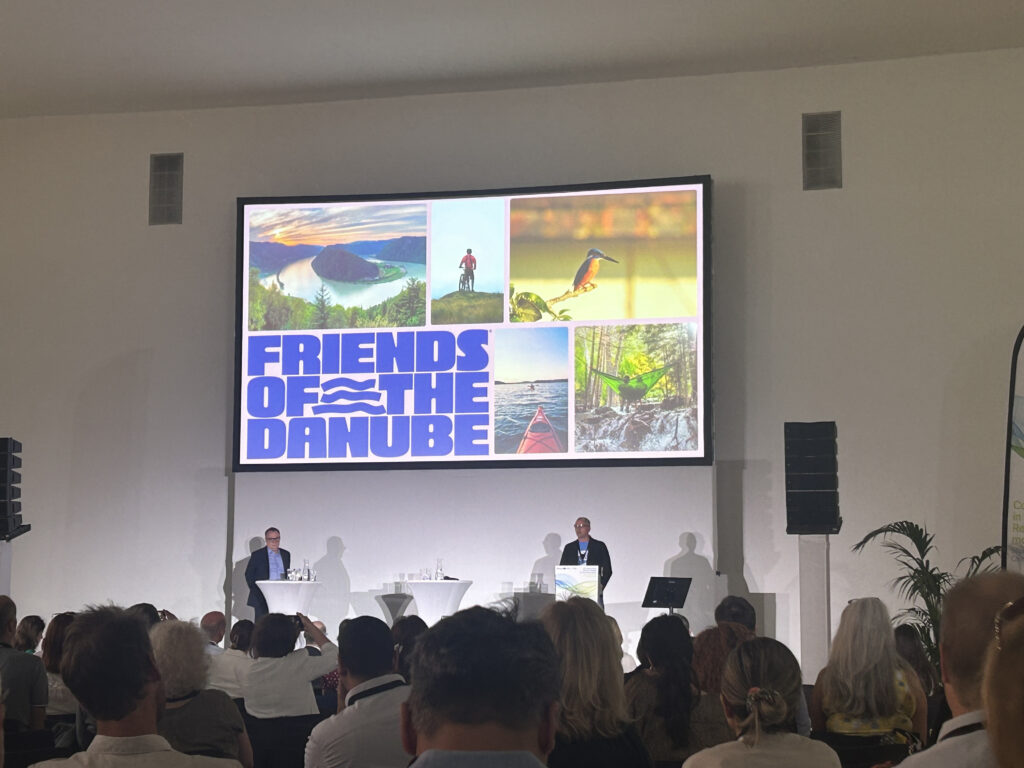
The Danube Youth Council (DYC) is a group of young people representing all EUSDR bodies, ensuring that their ideas are heard and considered at the political level. Comprising 28 members aged 18-29, with two representatives from each of the 14 Danube Region countries, including Bosnia and Herzegovina, Montenegro, and Serbia, the DYC members contribute to EUSDR governance meetings, collaborate with the Presidency, and engage in EUSDR Priority Areas.
The HARMONMISSIONS project aims to harmonise the implementation of European Missions in the Danube Region. The project focuses on two key EU Missions: Adaptation to Climate Change and achieving 100 Climate-Neutral and Smart Cities by 2030. It seeks to establish cooperation channels between partners to address climate change, which transcends national borders, and to raise awareness of these missions among both professionals and the public. The consortium includes participants from various Danube Region countries, including Bosnia and Herzegovina, Montenegro, and Serbia. The project is funded by the Interreg Danube Region Programme.
Recently, Elena Simion was invited to participate in the POLICY ANSWERS webinar to present the challenges and opportunities for the mission-oriented implementation of climate adaptation and sustainable cities. She mentioned how the HARMONMISSIONS project addresses these challenges in the Western Balkans. The POLICY ANSWERS monthly webinars aim to stimulate strategic conversations on aligning Western Balkan priorities with those of the EU across three thematic areas: Digital Transformation, the Green Deal, and Health Policy. Elena highlighted approaches to building the necessary knowledge capacities and governance models to advance EU Mission goals, with a particular focus on opportunities for cooperation with the Western Balkans. You can watch the webinar video below.
The European Energy Award (EEA) is a quality management and certification procedure that is well-established in the European reference framework and offers a practical approach to topics like climate protection and the Green Deal at the local level. The aim of the project EEA along the Danube is to increase the awareness and application of the European Energy Award within the Danube Region. Funded by the State Ministry of Baden-Württemberg, the project has a duration of 2.5 years and seeks to identify pilot regions and prepare them for the independent implementation of the EEA. Eight cities and municipalities in Bosnia and Herzegovina are part of the pilot regions. In 2023, a workshop took place in Tuzla, where representatives from municipalities and development energy agencies were informed about the EEA.
The ReInd-BBG project advocates for “Brownfield is Better than Greenfield” re-industrialisation in the Danube Region, aiming to strengthen institutional capacity and reduce fragmentation in spatial, economic, and environmental transformation. Brownfields are degraded lands, polluted in terms of soil fertility, due to human activities. These are closed industrial sites or mines that resulted from past industrial restructuring processes. The project seeks to demonstrate the advantages of this approach through regional examples. Three of the pilot locations are based in the Western Balkans: Nikšić in Montenegro (Zeljezara, a former steelwork area), Zenica in Bosnia and Herzegovina (Crkvička Brdo, a mining area), and Resita in Serbia (former industrial area Triaj Mociur Valea Terovei). Ongoing activities include capacity building and open brownfield days. The project is funded by Interreg Danube Region.
The 13th EUSDR Annual Forum concluded with valuable insights into the future of the Danube Region from expert perspectives. Participants were also invited to explore significant sites in and around Vienna, closely linked to the Danube River and the Danube Region, through five guided tours.
Currently, there are several calls for projects and events in the Danube Region. You can find them listed below the related posts at the end of this article.
